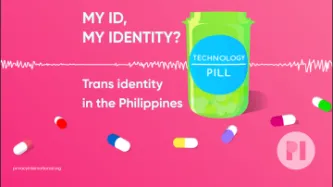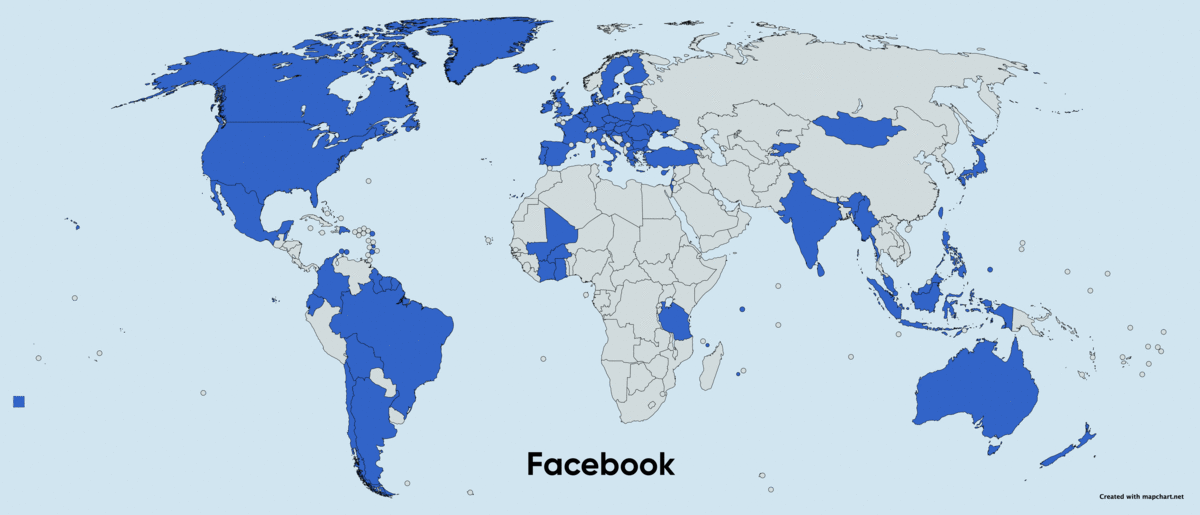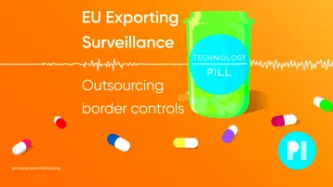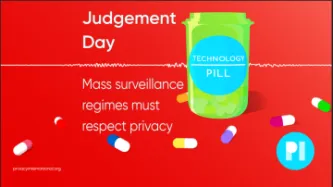Search
Content type: Long Read
… before a quick run with your favourite running app and a Google search for your next meal: technologies and services … and multiplicity. Unlike household names Facebook or Google, most of the companies tracking you online are …
Content type: Video
… No heightened transparency tools have been provided by Google. In December 2020, PI spoke to Alia Yofira to discuss … to transparency of online political ads. Target Profile Google Facebook Learn more Data and Elections Our fight …
Content type: Video
… e antes das eleições gerais de 2018, até ao momento, a Google falhou em introduzir as ferramentas de transparência … transparência dos anúncios políticos online. Target Profile Google Facebook Learn more Data and Elections Our fight …
Content type: Video
… you normally find your podcasts: Spotify Apple podcasts Google podcasts Castbox Overcast Pocket Casts Peertube …
Content type: Video
… early and ahead of the 2018 general elections, to date, Google has failed to introduce the transparency tools … to transparency of online political ads. Target Profile Google Facebook Learn more Data and Elections Our fight …
Content type: Long Read
… in the UK 2019 General Election. PI publishes research of Google and Facebook's policies, finding inconsistent and … We explored the harms resulting from Facebook and Google's inconsistent and unequal application of political …
Content type: Press release
… Key points We analysed the tools developed by Facebook, Google and Twitter to keep online political advertising in …
Content type: News & Analysis
… into the implementation of transparency tools by Facebook, Google and Twitter in relation to political advertising. … 2021 This map shows the countries in which Facebook and Google have implemented heightened transparency standards … defines political content and ads differently, with Google going as far as operating a country-specific …
Content type: News & Analysis
… of major challenges to the power of big platforms, like Google, Amazon, Facebook and Apple. Most will revolve around … against alleged anti-competitive practices of Facebook and Google , while demands for stronger regulation both in … seem to follow from such dominance. Alphabet is not just Google search engine, Amazon is not just selling books …
Content type: Video
… you normally find your podcasts: Spotify Apple podcasts Google podcasts Castbox Overcast Pocket Casts Peertube …
Content type: Video
… you normally find your podcasts: Spotify Apple podcasts Google podcasts Castbox Overcast Pocket Casts Peertube …
Content type: Video
… you normally find your podcasts: Spotify Apple podcasts Google podcasts Castbox Overcast Pocket Casts Peertube …
Content type: News & Analysis
… The European Commission has today concluded its review of Google's proposed acquisition of Fitbit. Privacy … has decided to let the merger go through, allowing Google's extraordinary power to expand into wearables and … The European Commission has today approved a merger between Google and Fitbit, the fitness tracker company. PI is …
Content type: Examples
… and Panoptykon Foundation have filed complaints against Google and Interactive Advertising Bureau (IAB) member … https://uk.reuters.com/article/us-eu-alphabet-privacy/google-adtech-firms-targe… See more examples AdTech … Regulatory complaint Learn more AdTech Target Profile Google …
Content type: News & Analysis
… in relation to the use of cookies on the French websites of Google and Amazon. The decision against Google While it seems to be broadly stated that the CNIL fined Google €100 million, a more accurate statement is that the …
Content type: Examples
… December 2020 French data protection regulator CNIL fined Google and Amazon €100 million and €35 million respectively … Protection Act. The CNIL found that the French websites of Google and Amazon had not sought the prior consent of … how to refuse any use of cookies. In relation to Google, the CNIL made an additional finding that the …
Content type: Guide step
… can help protect your privacy by evading large CDNs (e.g. Google Hosted Libraries). In this guide, you'll learn how to … added convenience and avoid large CDN providers (such as Google and Cloudflare) to prevent them from obtaining any …
Content type: Guide step
… If you want to isolate cookies from the same domain (e.g. Google Shopping and Google News), you can create one container for each domain. …
Content type: Guide step
… Guide Device Desktop Atención: Chrome es un producto de Google y, como tal, incorpora muchos mecanismos que posiblemente estén compartiendo datos con Google. Uno de estos mecanismos vincula automáticamente tu navegador a tu cuenta de Google cuando inicias una sesión en cualquier servicio de …
Content type: Guide step
… macOS Linux Guide Device Desktop Warning: Chrome is a Google product and as such embeds many mechanisms that might share data with Google. One such mechanism automatically links your browser to your Google account when you sign in on any Google service (e.g. …
Content type: Guide step
… can help protect your privacy by evading large CDNs (e.g. Google Hosted Libraries). In this guide, you'll learn how to … added convenience and avoid large CDN providers (such as Google and Cloudflare) to prevent them from obtaining any …
Content type: Guide step
… tu privacidad al evadir las grandes CDN (por ejemplo, Google Hosted Libraries). Con esta guía, aprenderás a … y prescindir de los grandes proveedores de CDN (como Google y Cloudfare) para evitar que puedan obtener datos …
Content type: Long Read
… order. Clue by BioWink Based in Germany 10M+ downloads on Google Play Store Clue provided us with a back-up of our … US, with EU representatives in Cyprus. 50M+ downloads on Google Play Store Flo sent us a password-protected back-up … Maya by Plackal Tech Based in India 5M+ downloads on Google Play Store Maya never responded to our DSAR despite …
Content type: Video
… you normally find your podcasts: Spotify Apple podcasts Google podcasts Castbox Overcast Pocket Casts Peertube …
Content type: Video
… you normally find your podcasts: Spotify Apple podcasts Google podcasts Castbox Overcast Pocket Casts Peertube …
Content type: Video
… you normally find your podcasts: Spotify Apple podcasts Google podcasts Castbox Overcast Pocket Casts Peertube …
Content type: Video
… you normally find your podcasts: Spotify Apple podcasts Google podcasts Castbox Overcast Pocket Casts Peertube …
Content type: Video
… you normally find your podcasts: Spotify Apple podcasts Google podcasts Castbox Overcast Pocket Casts Peertube …
Content type: News & Analysis
… Google is pushing a new "stalkerware" policy to reduce the … monitoring apps leave the door open to abuse Key points Google announced a new Stalkerware policy to be enforced on … to stakerwares and can be use for gender-based violence Google should consider OS levels solutions based on apps …
Content type: Examples
… describes the data transmitted to backend servers by the Google/Apple based contact tracing (GAEN) apps in use in … in this respect. However, the study also finds that the Google Play Services component of the apps contacts Google servers as often as every 20 minutes, potentially …






















